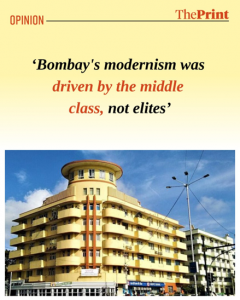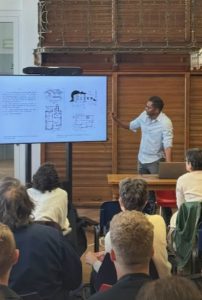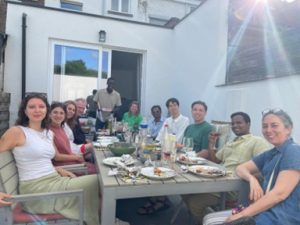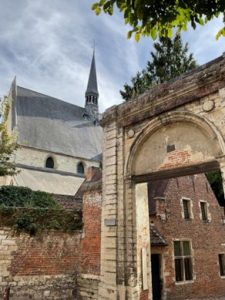Excy Hansda: Communicating Research Findings & Networking- Overseas Institutional Visit at the University of Antwerp, Belgium
Towards the end of my third year of PhD studies in Architectural History at the University of Liverpool, I joined the University of Antwerp as a Visiting Research Student (VRS) at the Faculty of Design Sciences, utilizing the Overseas Institutional Visit (OIV) funding from the NWCDTP. After completing my fieldwork and the initial drafts of the chapters of my PhD thesis, this was the ideal time for me to test my research findings on my peers and receive valuable feedback. It was also a time to review the work done by peers, network, and explore opportunities to collaborate with colleagues across the English Channel.
I worked with Dr Inge Bertels (Dean, Faculty of Design Sciences), whose expertise in Construction History helped me utilise unconventional archival sources, such as tenders, specifications, and old photographs, to examine the architectural history of Bombay suburbs from a different angle. We worked on converting two thesis chapters into journal articles. I converted one and submitted it to the Journal of Architecture, Taylor & Francis, which is currently under review. With a strong belief that research should not be limited to academic journals and conference rooms, I also wrote (with my colleague) an opinion article based on my thesis for The Print, an Indian online newspaper (Link- https://theprint.in/opinion/bombay-buildings-modernism-driven-by-middle-class-not-elites/2661255/)

Opinion Article on The Print, 18th June 2025
I managed to present my research and get feedback from colleagues based at the University of Antwerp and colleagues and alums of Belgian universities (KU Leuven, VUB Brussels, Ghent University). I presented a paper titled “Suburbs of Bombay: Spaces of Power and Resistance” at the PhD Research Colloquium, Faculty of Design Sciences, University of Antwerp on 28th May 2025. I also presented a paper titled “Middle-Class Agency in the Suburbs of Bombay” at the 6th Construction History Congress on the 16th May 2025 (link- https://medialibrary.uantwerpen.be/files/11326/4e043a77-04db-4471-acba-25967fa1604d.pdf)
During these two conferences, I had the opportunity to meet people researching architectural history in Pune (formerly part of the Bombay Presidency), who provided necessary feedback and asked astute questions. The congress was also a good opportunity to meet Dr Katie Lloyd-Thomas, who shared her insights on colonial cities in India, in addition to hearing her keynote address. I also got feedback on my “decolonial” methodologies and gathered insights on new approaches from research staff working at other Belgian universities.

Paper Presentation at the 6th Construction History Conference at Antwerp, Belgium
This was also a great networking opportunity to meet researchers working in similar fields and explore future possibilities. While familiar with the work of architectural historians of colonialism in India and the UK, I met historians working on colonial contexts in the Gambia, Congo, Turkey, and Brazil working at the Henry Van De Velde Group at the University of Antwerp. During this studentship, I also applied and got selected to present my research findings at the ArchLabour “Colonial Postcolonial Landscapes” Conference, to be held in Lisbon, Portugal, in February 2026, where I would have the opportunity to meet many of these researchers again. I also participated in the 6th International Conference on Structures and Architecture, held from 8 to 11 July 2025, as an audience member. During this event, I attended the session on “Histories of Structural and Architectural Design”, which provided another great networking opportunity. We had conversations on postdoc opportunities in Europe and how we can connect different approaches between the UK and the continent in potential research collaborations.

Barbeque of Henry van de Velde Research Group of Faculty of Design Sciences, University of Antwep
Studying architectural history in continental Europe also means having the opportunity to use the cities as a living laboratory for your theoretical understanding. I also worked as an assistant for the tour “Cast in Antwerp”, which was a tour of the history of iron buildings in Antwerp, led by Inge Bertels, where I learned about the rise of modern architecture in Europe. I also visited the MAS Museum and Rubenshuis in Antwerp, where I learned about the history of the city. I visited the UNESCO World Heritage Sites of the Great Beguinage in Leuven and the Belfries in the medieval churches of Leuven, as well as the historic city center in Brussels, which was a rich experience for me, given my background in conservation and heritage.

Visit to the UNESCO World Heritage Site of the Great Beguinage in Leuven
My OIV to the University of Antwerp was a key moment in advancing my PhD research. It offered valuable feedback, new methodological insights, and interdisciplinary engagement. I strengthened international networks and explored collaborative opportunities. The experience also deepened my understanding of architectural heritage in a global context.

0 Comments